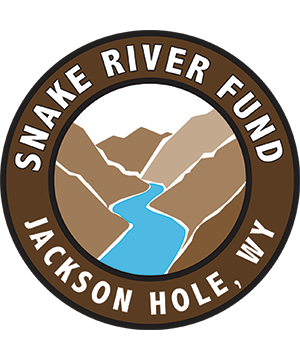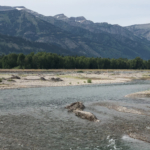Is Your Lawn Trout Friendly?
Have you seen these fishy signs floating around town? You may have seen one in your neighbor’s yard or at a local business or a public park. The original Abby Paffrath and Ben Roth “Certified Trout Friendly” signs indicate lawns that have committed to “trout friendly” landscaping practices.
Why trout friendly?
Protecting the health of the Upper Snake River watershed and the clean water its trout and wildlife depend upon is critical for all of us living in Jackson Hole. What we do to our lawns can directly affect the health of our river and its fishery. By making small changes to our lawn care and using “best management practices”, we can collectively make a positive impact. Continue reading to learn techniques that promote a healthier watershed for our community and get your lawn (and your neighbors) certified as “trout-friendly”!
A recent study by the U.S. Geological Survey found that residential landscaping is one of the major sources of nutrient pollution in the Fish Creek watershed. But it’s not just the Westbank that needs to consider how their lawns are impacting water—other parts of Jackson Hole are seeing nutrient loading issues as well. By making small changes to our landscaping practices, we can collectively improve water quality in Jackson Hole for all the plants, people, and wildlife that rely on clean water. Here are four easy Trout Friendly practices you can commit to that will greatly reduce your lawn’s impact on water quality:
- Limit Fertilization. Use slow-release or organic fertilizer only if needed, not to exceed two pounds of nitrogen per 1,000 square feet of lawn per year. Don’t fertilize within 20 feet of water.
- Be Water Wise. Sprinkle your lawn with water at dawn or dusk every other day, and don’t water while it’s raining. Raise your mower blade height to three to four inches so less water and fertilizer are needed.
- Plant Natives & Maintain Streamside Buffers. Maintain a five-foot buffer of unmanicured landscaping around water to act as a natural filter between lawns and water bodies.
- Use Herbicides and Pesticides Appropriately. Only apply herbicide for state and county listed noxious weeds, using spot spraying or mechanical removal techniques where appropriate. Contact Teton County Weed & Pest District for invasive species management plan information.
In addition to a handful of businesses, three Teton County parks, four homeowners associations, and over 80 individuals have all committed to Trout Friendly landscaping practices. Click here to join the trend
Brought you in partnership with Jackson Hole Clean Water Coalition.



